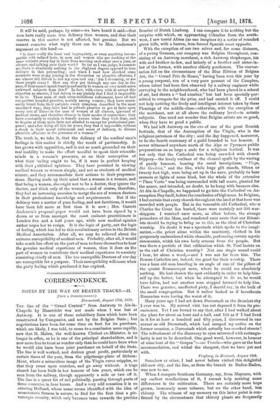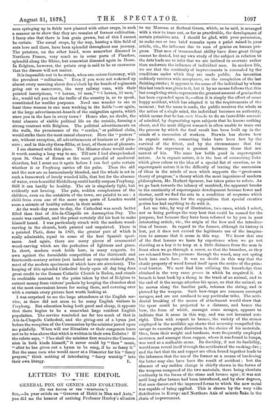CORRESPONDENCE.
NOTES BY THE WAY ON BEATEN TRACKS.—IL
LFROM A CORHESFONDENT.]
Darmstadt, August 17th, 1878. TIIE line of the "Grand Central" from Antwerp to Aix-la- Chapelle by Maastricht was not made when I was last at Antwerp. It is one of those subsidiary lines which have been constructed by Companies, and not by the Belgian State ; but negotiations have been for some time on foot for its purchase, which are likely, I was told, to come to a conclusion more rapidly, now that M. Malou, the well-known Clerical ex-Minister, is no longer in office, as he is one of the principal shareholders, and is now more free to treat as vendor only than he could have been when he would also have been joint purchaser on behalf of the State. The line is well worked, and derives great profit, particularly at certain times of the year, from the pilgrimage-place of Sichem- Mont, where a miraculous image of the Virgin cures cripples, so that they come upon crutches, and go away without. A huge church has been built in her honour of late years, which can be seen from the railway, though apparently a mile or two off it. The line is a queer bit of rail politically, passing through parts of three countries in four hours. And a very odd sensation it is on entering Holland, whose name seems identified with the idea of monotonous flatness in nature, to find for the first time a pic- turesque country, which only becomes tame towards the prettier
frontier of Dutch Limburg. I can compare it to nothing but the surprise with which, on approaching Gibraltar from the south- west, I saw torrid Africa (as one imagines it) a series of rounded green hills, with a barren, iron-bound Spanish coast opposite.
With the exception of our two selves and, for some distance, of a young German, our company was Belgian throughout, con- sisting of an Antwerp merchant, a rich Antwerp shopkeeper, his wife and brother-in-law, and latterly of a brother and sister-in- law of the former, with another elderly gentleman. The conver- sation fell on the circumstance of the Blue Ribbon of Belgian Art, the "Grand Prix de Rome," having been won this year by a young corporal, son of a very poor peasant of the Campine, whose talent had been first observed by a railway engineer while surveying in the neighbourhood, who had been placed in a school of art, had drawn a "bad number," but had been specially per- mitted to compete for the prize, and had carried it off. I could not help noticing the lively and intelligent interest taken by these Flemings of the middle-class—otherwise, with the exception of the merchant, not at all above the ordinary level—in artistic subjects. One need not wonder that Belgian artists are so good, when they have so good a public.
We had left Antwerp on the eve of one of the great Romisk
festivals, that of the Assumption of the Virgin, who is the religious patroness of the city ; and the day happened, moreover, to be the fourth centenary of a guild founded in her honour. I never witnessed anywhere north of the Alps or Pyrenees public preparations on so large a scale for a religious festival. It was not only that the Cathedral was being crowded with church frippery—the lovely outlines of the chancel spoilt by the waving of gaudy banners, bearing the usual inscriptions, "Virgo, Dei Gettitrix," and the like, while huge gilt stands, fifteen or twenty feet high, were being set up in the nave, probably to bear cressets or lights of some kind, but the whole of the extensive "Place Vette " was being surrounded with tall masts, planted for the nonce, and intended, no doubt, to be hung with banners also. At Aix-la-Chapelle, we happened to go into the Cathedral on As- sumption Day itself, before the conclusion of high mass. In Belgium, I feel certain that every church throughout the land at that hour was crowded with people. But in the venerable old Cathedral, whet e Charles the Great lies buried, there were certainly not 300 wor- shippers. I watched once more, as often before, the strange procedure of the Mass, and wondered once more that our Ritual- ists should be trying to bring us to this, as the ideal of Christian worship. No doubt it was a spectacle which spoke to the imagi- nation,—the priest alone within the sanctuary, clothed in his gorgeously embroidered white chasuble, performing certain mystic ceremonies, which his own body screens from the people. But was there a particle of that edification which St. Paul insists on as the end of Christian worship ? Not one single sound could I hear, let alone a word,—and I was not far from him. The Roman Catholics are, indeed, too good for their worship. There was a lame old man kneeling in an angle of one of the pillars of the quaint Romanesque nave, where he could see absolutely nothing. He had chosen the spot evidently in order to help him- self up the better, but when he attempted to do so, he would have fallen, had not another man stepped forward to help him. There was genuine, unaffected piety, I should "say, in the bulk of the small congregation. But it rather looked as if hereabouts Romanism were having the worst of it.
Many years ago I had set down Darmstadt as the dreariest city I ever was in. My second visit has not deposed it from its pre- eminence. Yet I am bound to say that, after I bad walked about
the place for about an hour and a half, and felt as if I had lived in it for at least a hundred and fifty years, I discovered in one corner an old Darmstadt, which had escaped my notice on the former occasion, a Darmstadt which actually has crooked streets I The refreshment of the discovery to eyes saturated with rectangu- larity is not to be described. One good word, however, in honour of mine host of the" Grapes "—zur Traube—who gave us the best accommodation, and withal the cheapest, that we have yet met with.
Freyburg, in Breisach, August 19th.
Somehow or other, I had never before visited this delightful old-new city, and the line, as from the branch to Baden-Baden, was new to me.
When I compare Southern Germany, say, from Mayence, with my earliest recollections of it, I cannot help noticing some differences in the cultivation. There are certainly more hops grown, immensely more tobacco, but on the other hand, less chicory. The witness of my memory on this latter point is con- firmed by the circumstance that chicory plants are frequently seen springing up in fields now planted with other crops, in such a manner as to show that they are remains of former cultivation. I fancy also that there is less grain grown, but of this I cannot be certain. The cereal crops, by the way, barring a thin field of eats here and there, have been splendid throughout our journey. The potatoes, on the other hand, were somewhat diseased in Northern France, very much so in some parts of Flanders, splendid along the Rhine, but somewhat diseased again in Hesse. In Belgium, however, the potato crop is said to be so enormous that the disease will not matter.
It is impossible not to be struck, when one enters Germany, with the prevalent "militarism." Even if you were not wakened up almost every morning about five o'clock by the bands of regiments
going out to manoeuvre, the very railway vans, with their painted inscriptions, "8 horses, 40 men," "6 horses, 32 men,"
Sm., would tell you that the traffic of the country is, so to speak, constituted for warlike purposes. Need one wonder to see at least three women to one man working in the fields ?—or again, at the large advertisement-boards of the emigration agents, which stare you in the face in every town ? Hence also, no doubt, the total absence of visible political life on the outside, forming a strong contrast with Belgium. The political advertisements on the walls, the prominence of the " cercles," or political clubs, would strike there the most casual observer. Here the " posters " are, without exception, all advertisements of business or of plea- sure ; and in this city three-fifths, at least, of them are of pleasure.
I am charmed with this place. The Minster alone would make it worth coming a long way to see. Till now I had always looked upon St. Ouen of Rouen as the most graceful of medimval churches, but I must see it again before I can feel quite certain whether it or Freyburg carries off the palm. Then the old and the new are so harmoniously blended, and the whole is set in such a framework of lovely wooded hills, that but for the absence of water, even beautiful Heidelberg could hardly surpass Freyburg.
Still it can hardly be healthy. The air is singularly light, but evidently not bracing. The pale, sodden complexions of the children, even on the outskirts of the town, are painful to see ; a child from even one of the more open parts of London would seem a miracle of healthy colour, in their midst.
At the week-day mass to-day, the Cathedral was much better filled than that of Aix-la-Chapelle on Assumption Day. The music was excellent, and the priest certainly did his best to make himself heard. I was particularly struck with the modern wood- carving in the church, both painted and unpainted. There is a painted Ilea, done in 1869, the greater part of which is really admirable, equal to some of the best Spanish speci- mens. And again, there are many pieces of ornamental wood-carving which are the perfection of lightness and grace. in short, modern work holds here, in many respects, its own against the formidable competition of the thirteenth and fourteenth-century artists (not indeed as respects stained glass, most of the modem specimens of which here are atrocious). The keeping of this splendid Cathedral freely open all day long does great credit to the Roman Catholic Church in Baden, and stands in creditable contrast to the pains taken by that of Belgium to extract money from visitors' pockets by keeping the churches shut at the most convenient hours for seeing them, and covering over with a curtain every picture best worth looking at.
I was surprised to see the large attendance at the English ser- vice, as there did not seem to be many English visitors in Freyburg. But education being both good and cheap, it appears that there begins to be a somewhat large resident English population. The service reminded me far too much of that in Aix-la-Chapelle Cathedral, and the giving-out of a hymn just before the reception of the Communion by the minister jarred upon me painfully. When will our Ritualists or their congeners learn
not to be wise above that which is written in their own Rubrics? If the rubric says," Then shall the minister first receive the Commu- nion in both kinds himself," it never could by " then " mean, "after he has given out a hymn to be sung, if he so fancy it." But the same men who would sneer at a Dissenter for his "fancy prayers," think nothing of introducing "fancy worship" into































 Previous page
Previous page